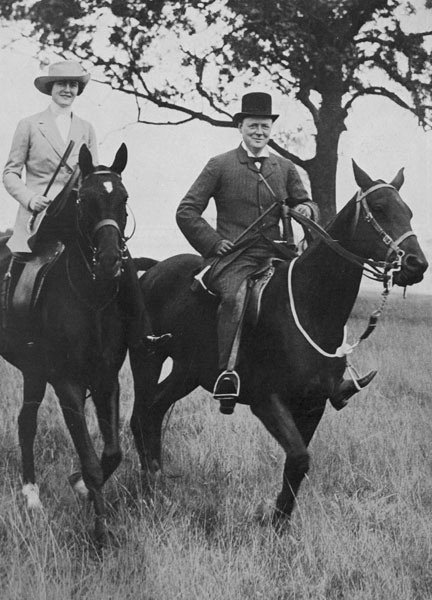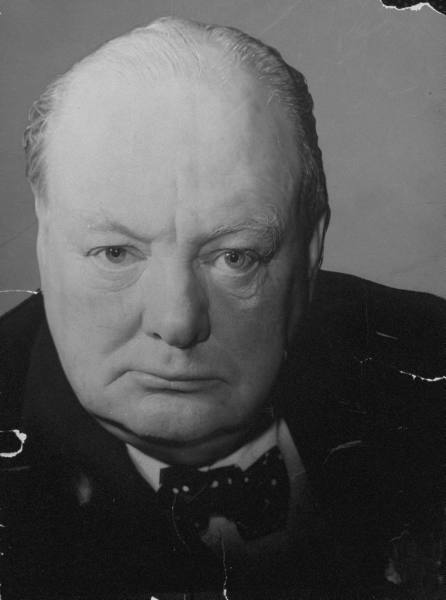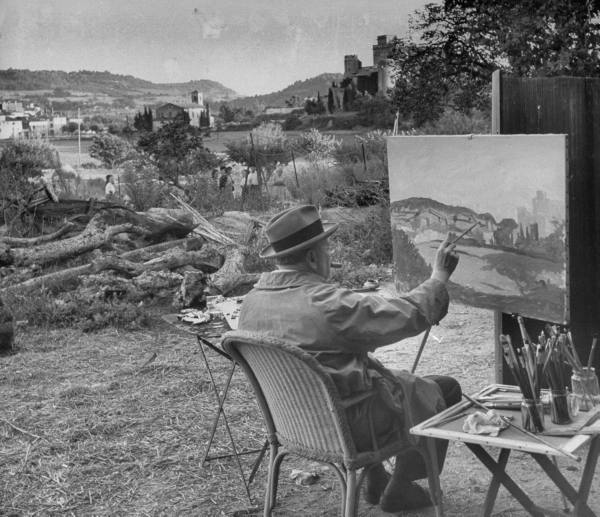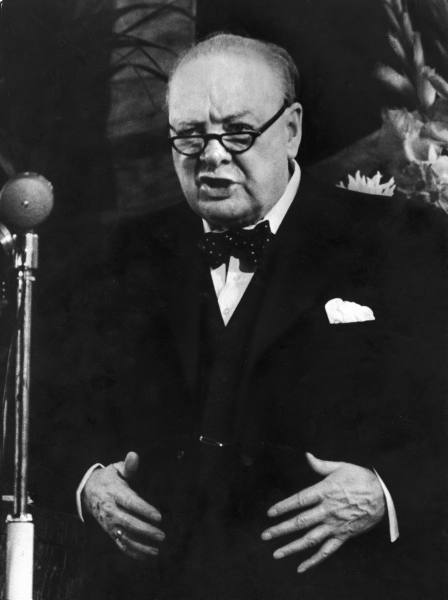
Editor’s note: This is a guest post from Jonathan W. Thomas. Mr. Thomas runs the world’s largest Anglophile blog – Anglotopia – which has become a gathering place for Anglophiles all over the world. You can connect with him on Twitter as @jonathanwthomas.
As an ardent Anglophile, I have a lot of respect and admiration for Winston Churchill – Britain’s leader during the crucial World War II years. While he was not a perfect man by any stretch – he was a great man whose life has much to teach us about manliness.
Winston Churchill really epitomized what it meant to be a man in the early twentieth century. So, what were these manly traits and how can we apply them to our own lives? Let’s take a look.
Loyalty and Love

Churchill loved the British Empire, his monarch and his country. It was a love that he had his entire live. It was a love that inspired him to write great books and speeches, paint great pictures, and lead his country through its darkest days. Even though he was a ‘manly man,’ he was in touch with his feelings and felt love. He was also very loyal to his wife, Clementine. They were married until the day he died.
Standing up for what you believe
Throughout his parliamentary career, Churchill was often a political pariah. By the 1930’s, his career was considered over, and he was seen as the sad old man of the House of Commons, suffering from the ‘get off my lawn’ syndrome. He was one of the few voices that warned of the rise of Hitler and a newly ascendant Germany. No one wanted to listen to the truth, but he persisted in speaking it anyway.
Perseverance

Churchill wasn’t one to give up easily. He was a man that was ALWAYS working. His family was not particularly rich, and so he had to rely on his own skills and knowledge to make a living. Churchill was a man that could sit down and write massive tomes of history from beginning to end – a testament to his inability to give up. When he was defeated in the 1945 election and was ejected by the very people he lead to victory, did he quit? Nope, he stayed on as the leader of the opposition and led his party to victory again in 1950, becoming Prime Minister once more.
Adventurous
Churchill was always up for an adventure and managed to travel the world many times, before such trips were commonplace. At a young age, he joined the military and saw action all over the British Empire. He relished his military adventures and spun his experiences into fabulous tales for the newspapers back home. It jump started his writing career – something that would keep him financially afloat the rest of his life.
Erudite
Churchill was a product of the British Public School system, meaning he was very well read. You can bet that he had to memorize entire works of literature – a skill recently featured on the Art of Manliness. Even though he was not a particularly great student – in fact he failed the military academy exams multiple times, he would go on to write great books of history and masterful speeches. He had a wit that could shut anybody up and was known for his wonderfully crafted insults.
Artist

Many men dismiss arts and crafts as unmanly and useless. Churchill, however, was an avid painter, a hobby that helped him keep the Black Dog, what he called his depression, at bay. He was actually a pretty good artist, and his paintings are very sought after in the art world. Many would argue that his paintings are much nicer than anything put out by Hitler when he was an artist. Churchill loved painting so much he even wrote a book about it called “Painting as a Pastime.” There is nothing more manly than appreciating a nice work of art or piece of classical music. Winston would; so should you.
Supreme Confidence
Churchill thought very highly of himself. He believed he was destined for greatness. This belief guided his every action and decision in life. I’m not suggesting that everyone should believe they will lead their country to greatness. What can be taken from this is that you really need to have confidence in yourself and your abilities before anything else. You are the source of all your success, and if you don’t believe that you can achieve great things, then you won’t.
Belief in the Greater Good
As a wartime leader, Churchill had many tough decisions to make. From destroying the French Fleet at Oran to the bombing of Dresden, he made many controversial choices that historians debate to this day. Whether or not his decisions were right or wrong, he believed he was doing the right thing and making the best choice for Britain.
Belief in the Written Word
Churchill was above all things, a writer. And a damn good one at that. He believed in the written word as a tool for inspiration and leadership. He hand wrote his speeches, working to create just the right flow and structure to maximize the speech’s effect on the listener. He used his words to stir his people, to comfort them, and inspire them to believe in the cause they were fighting for. He also wrote countless volumes on history from “A History of English Speaking Peoples” to his own Six Volume Account of World War II.
Oratory

Not only could Churchill write a masterful speech, he could deliver one with true power and feeling. He was a superior orator and gave some of the greatest speeches in history. His voice was full of confidence and steadfastness. In Britain’s darkest hours, families huddled around their radio, scared, anxious, and worried about what was happening. Churchill’s voice flooded into their homes, bringing with it the comfort of knowing that the country was in the best of hands.
Routine
Churchill was not a man who particularly enjoyed vacations; he always needed to be doing something. Whether that was painting, reading or writing, he constantly kept himself busy. His productivity was enhanced by the routine he set for himself. Even when he was Prime Minister, he stuck to it. He rose late, worked in bed in the morning, took a bath and nap in the afternoons and worked into the night, often until 4 am. Score one for night owls.
Willingness to Fight
Winston never gave up. Whether is was mastering painting, battling his own political party or defending his country, Churchill was not a quitter. He’s an excellent example of a man whom when confronted – confronts right back and never surrenders. Now, this does not mean that all men should look for a fight – only that we should care about the fights that MATTER.
Listen to our podcast on the making of Winston Churchill:
Tags: Winston Churchill

